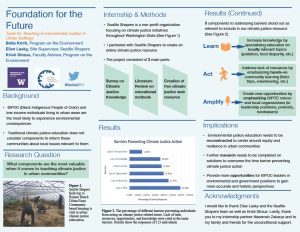Foundation for the Future: Tools for Teaching Environmental Justice in Urban Environments
While environmental education should be available to the public, barriers are preventing marginalized groups from accessing this vital information. As the planet continues to warm and big industries continue to pollute, POC and low-income populations will continue to see disproportional health-effects of these changes. However, these same populations are the least likely to receive adequate environmental education. Now more than ever there is a necessary demand for accessible environmental justice education. The purpose of my study was to figure out Seattleite’s current knowledge on environmental justice. Additionally, I wanted to find the best way to teach environmental justice to those who are most impacted by modern-day ecological issues. To accomplish this task, I made a survey to analyze current attitudes of environmental justice. Additionally, I completed a literary analysis of numerous studies to find the best and most effective way of teaching environmental justice to urban communities. Findings show that most Seattleites are not concerned about local environmental issues. Additionally, many cite lack of knowledge as their reason for not participating in environmental justice initiatives. The deficiency of accessible educational resources is an issue that needs to be addressed as minority populations become increasingly more susceptible to unjust environmental conditions.
